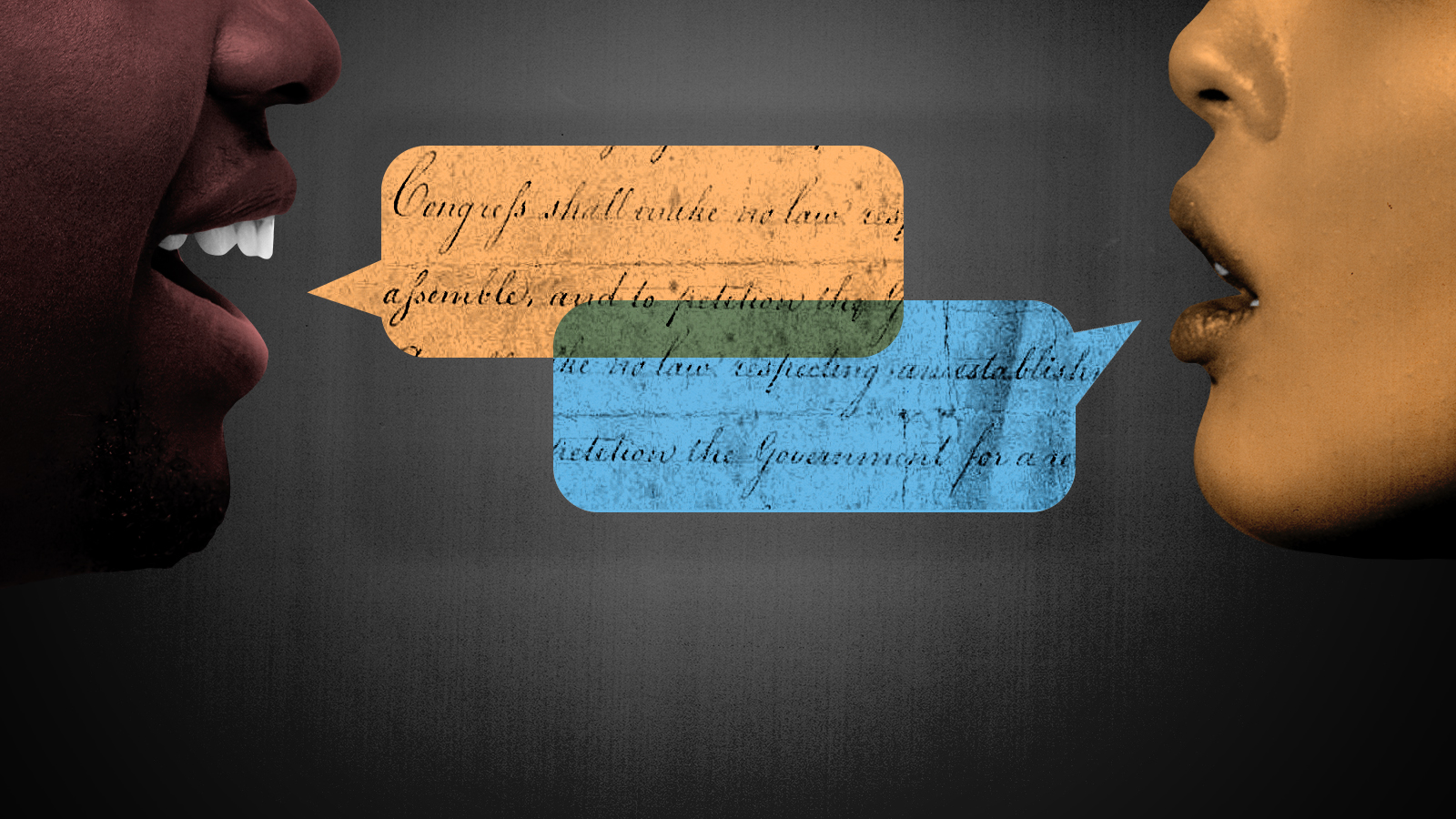The silver lining of America's free speech worries


A free daily email with the biggest news stories of the day – and the best features from TheWeek.com
You are now subscribed
Your newsletter sign-up was successful
Free speech has been in the headlines, at least if you follow dispatches from the culture war. From conservatives denouncing cancel culture to progressives warning of educational censorship, nearly everyone is convinced their liberty to read, say, and publicize what they think is endangered.
Some of these threats are very real, while others seem dubious. But it's worth stepping back from specific cases to consider how unusually strong American commitments to speech and expression still are by international standards.
Many liberal democracies offer some constitutional protections, but the U.S. is an outlier in courts' application of those protections to include ostensible hate speech, unintentionally defamatory statements about public figures, and the expression of deeply offensive views such as Holocaust denial. Beyond the law, Americans also stand out for our overwhelming belief that controversial and provocative speech should be allowed. If Americans are worried about present conditions for free speech, it's partly because we're unusually certain free speech is important.
The Week
Escape your echo chamber. Get the facts behind the news, plus analysis from multiple perspectives.

Sign up for The Week's Free Newsletters
From our morning news briefing to a weekly Good News Newsletter, get the best of The Week delivered directly to your inbox.
From our morning news briefing to a weekly Good News Newsletter, get the best of The Week delivered directly to your inbox.
Two events this week highlight the distinctiveness of American speech culture. One took place in Germany, where the federal Ministry of the Interior announced it is illegal to publicly support the Russian invasion of Ukraine. The prohibition isn't limited to posters, billboards, or other forms of public expression. It even extends to displays of the letter Z, which has become a symbol of support for Russia's war.
Germany's restrictive approach — which is consistent with its policy on Nazi symbols and paraphernalia — may seem justified by its particular history. It's harder to explain the decision by prosecutors in Finland to charge a member of parliament and a bishop of the Finnish Evangelical Lutheran Church with hate speech. Their offenses: The lawmaker wrote a pamphlet defending "biblical marriage" that was published by the bishop's church.
To be fair, the charges were dropped on Wednesday, partly because the court ruled the intention was to express a religious belief rather than to "disparage homosexuals." But the fact that such charges could even be brought — and that judges are entitled to impose criminal penalties based on their interpretation of a writer's motives — should remind us how special and valuable our distinctive approach to speech really is.
Educational and employment settings pose special challenges, yes. So do issues of obscenity, a category that courts have narrowed but not recognized as constitutionally-protected speech. But when it comes to core civic and religious activities, the First Amendment protects doctrinaires and dissenters, creators and cranks, fanatics and skeptics alike.
A free daily email with the biggest news stories of the day – and the best features from TheWeek.com
Thank God for that.
Samuel Goldman is a national correspondent at TheWeek.com. He is also an associate professor of political science at George Washington University, where he is executive director of the John L. Loeb, Jr. Institute for Religious Freedom and director of the Politics & Values Program. He received his Ph.D. from Harvard and was a postdoctoral fellow in Religion, Ethics, & Politics at Princeton University. His books include God's Country: Christian Zionism in America (University of Pennsylvania Press, 2018) and After Nationalism (University of Pennsylvania Press, 2021). In addition to academic research, Goldman's writing has appeared in The New York Times, The Wall Street Journal, and many other publications.
-
 The Olympic timekeepers keeping the Games on track
The Olympic timekeepers keeping the Games on trackUnder the Radar Swiss watchmaking giant Omega has been at the finish line of every Olympic Games for nearly 100 years
-
 Will increasing tensions with Iran boil over into war?
Will increasing tensions with Iran boil over into war?Today’s Big Question President Donald Trump has recently been threatening the country
-
 Corruption: The spy sheikh and the president
Corruption: The spy sheikh and the presidentFeature Trump is at the center of another scandal
-
 Big-time money squabbles: the conflict over California’s proposed billionaire tax
Big-time money squabbles: the conflict over California’s proposed billionaire taxTalking Points Californians worth more than $1.1 billion would pay a one-time 5% tax
-
 Did Alex Pretti’s killing open a GOP rift on guns?
Did Alex Pretti’s killing open a GOP rift on guns?Talking Points Second Amendment groups push back on the White House narrative
-
 Washington grapples with ICE’s growing footprint — and future
Washington grapples with ICE’s growing footprint — and futureTALKING POINTS The deadly provocations of federal officers in Minnesota have put ICE back in the national spotlight
-
 Trump’s Greenland ambitions push NATO to the edge
Trump’s Greenland ambitions push NATO to the edgeTalking Points The military alliance is facing its worst-ever crisis
-
 Why is Trump threatening defense firms?
Why is Trump threatening defense firms?Talking Points CEO pay and stock buybacks will be restricted
-
 The billionaires’ wealth tax: a catastrophe for California?
The billionaires’ wealth tax: a catastrophe for California?Talking Point Peter Thiel and Larry Page preparing to change state residency
-
 Trump considers giving Ukraine a security guarantee
Trump considers giving Ukraine a security guaranteeTalking Points Zelenskyy says it is a requirement for peace. Will Putin go along?
-
 Bari Weiss’ ‘60 Minutes’ scandal is about more than one report
Bari Weiss’ ‘60 Minutes’ scandal is about more than one reportIN THE SPOTLIGHT By blocking an approved segment on a controversial prison holding US deportees in El Salvador, the editor-in-chief of CBS News has become the main story
